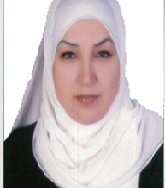Organizing Committee Member

Duaa Dakhlallah
Assistant Professor
West Virginia University
USA
Biography
Biography (Max. 250 words) Personal Statement My research focuses on the genetic mechanisms and regulatory pathways involved in pulmonary disease. In my graduate study I had focused on the role of microRNAs and epigenetic regulators in disease pathology. Specifically, we had identified alterations in gene regulation that correlates with clinical severity of disease in IPF. This has allowed us to target potential therapies, some of which have shown significant promise in our small animal models. While my current focus is on patients with IPF, these pathways allow diverse application too many fields of study. We have developed several collaborations with clinicians and researchers a like examining epigenetic regulation in diseases such as breast cancer, sepsis and acute respiratory distress syndrome. The central theme of my research is to identify epigenetic mechanisms by which prolonged macrophage survival can amplify the immune response and contribute to cancer, metastasis, Autophagy, chronic lung inflammation in idiopathic pulmonary fibrosis (IPF) and other inflammatory lung diseases. Thus, my research focuses on two projects involving microvesicles and epigenetic regulation. We currently are examining the interplay of DNA methyltransferases and microvesicles in cancer and inflammation. We have several collaborative efforts with colleagues within the University and my former mentors as well with the Institute for Systems Biology. Currently, we are investigating how macrophages communicate via secreted microvesicles (MVs) which are taken-up by neighboring epithelium. Since July 2013 I was added to the Oncology T32, and had generated data demonstrating that MVs contain mRNAs coding the epigenetic regulating machinery, DNA methyltranferases (DNMTs) and histone deacetylases (HDACs), which regulate promoter CpG island methylation and resulting gene expression of tumor suppressor genes (TSGs) and genes driving epithelial-to-mesenchymal transition (EMT) in epithelial cells. This data was accepted as both a poster and short talk format for the 2014 AACR Cellular Heterogeneity in the Tumor Microenvironment in San Diego, CA February 26. Duaa will also be presenting this work in poster form at the OSUCCC – James 16th Annual Scientific Meeting on February 28. Furthermore, we reported that activation and stabilization of a hypoxia-inducible transcription factor (HIF-2 alpha) with a novel PHD3 inhibitor slows tumor growth and angiogenesis in melanoma. Formerly, the HIF proteins were thought to be pro-angiogenic in the hypoxic conditions of solid tumors. We recently developed a new and unique transgenic mouse model with conditional TIE2 receptor knock out in the myeloid cell lineage, LysMcre/TIE2 floxed. These tumor-bearing mice (either by orthotopic mammary gland injections or crossed with MMTV-PyMT spontaneous breast cancer mice), lack the pro-angiogenic macrophage phenotype known as “TIE2-expressing monocytes/macrophagesâ€, or TEMs. We developed this transgenic mouse model to demonstrate a causal role for TEMs in the growth, progression, angiogenesis, and metastasis of breast cancer. Information gained from these mice will be used to develop new treatment possibilities for breast cancer patients. Another part of the program involves our work with AKB-6899, a novel small molecule inhibitor of prolyl hydroxylase-3 (PHD3) and stabilizer of HIF-2alpha. We reported that AKB-6899 can induce soluble VEGF receptor-1 (sVEGFR-1) expression from tumor macrophages, sequestering tumor- and macrophage-derived VEGF bioactivity resulting from hypoxia. Furthermore we found that AKB-6899 has an epigenetic effect on many oncogenes and EMT pathway. Through a sponsored research program and funding from Akebia Therapeutics, we are performing pre-clinical testing on human tumor xenografts in SCID mice to get IND and FDA-approval of AKB-6899 for use in non-small cell lung cancers into clinical trials. We have also established collaborations with experts in RNA-binding and chemical engineering to investigate aspects of miRNA/mRNA/protein packaging to the microvesicles. Thus, in summary, my funding and publication record underscores my technical capabilities and scientific achievements. As described in the proposal, our collaborative efforts on this proposal will enable us to perform preclinical testing of exciting new treatments for patients with breast cancer who otherwise have weak inefficient options clinically. Positions Research Assistant Professor, West Virginia University 2015-present Assistant Professor, American University of Middle East 2014-2015 Post-Doctoral Researcher, Ohio State University, 2011-present Graduate Research Assistant, Ohio State University, 2006-2011 Graduate Student Assistant, Ohio State University, 2007-2008 Research Assistant, Ohio State University, 2001-2005 School Manager, Islamic School, 2002-2004 Research Assistant, Al-bayt University, Jordan, 1993-1994 Teaching Assistant, Mu’tah University, Jordan, 1991-1994 Laboratory Assistant, Mu’tah University, Jordan, 1991-1992
Research Area
Research Interest Molecular genetics, epigenetics, DNA methylation, lung fibrosis, sepsis, microvesicles, miRNA, IPF, HDACs, DNMTs, Aging, Cystic Fibrosis.
